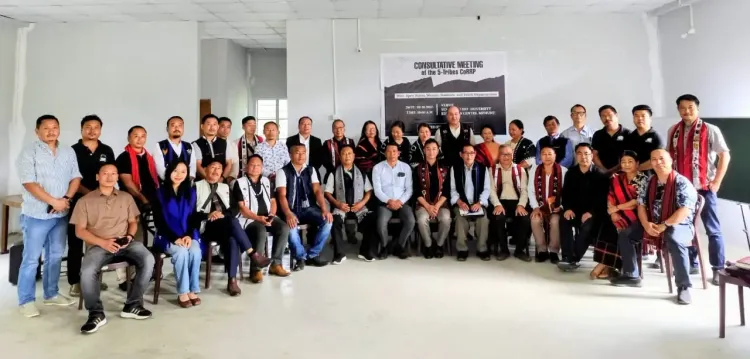Did Five Naga Tribes Really End Their Boycott of Government Events?

Synopsis
Key Takeaways
- The Five Tribes CoRRP has lifted its boycott of government events.
- The Nagaland state Cabinet accepted key demands related to job reservation policy.
- A consultative meeting was held at the Sendenyu Biodiversity Education Centre.
- The policy has been under scrutiny for its relevance to current socio-economic realities.
- The CoRRP represents five major tribes in Nagaland.
Kohima, Oct 20 (NationPress) The Five Tribes Committee on Review of Reservation Policy (CoRRP), which has been advocating for a reevaluation of the state's job reservation policy in Nagaland for several months, announced on Monday that they have lifted their boycott of all state government activities. This decision follows the state Cabinet's acceptance of their essential demands.
The 5 Tribes CoRRP convened a consultative meeting with the five apex tribe bodies, including their frontal units, on Monday at the Sendenyu Biodiversity Education Centre located in Tseminyu district.
In a joint statement, Member Secretary G.K. Zhimomi and Convenor Tesinlo Semy expressed their appreciation for the Nagaland state Cabinet's decision to change the nomenclature from Job Reservation Commission to Commission for Review of Reservation, as well as to broaden the Terms of Reference beyond job employment, aligning with their representation submitted to the government on September 24.
“The 5 Tribes CoRRP and the five apex tribe bodies are prepared to offer full cooperation to the Commission whenever requested. With the state cabinet acknowledging our demands, the previous non-participation by the five apex tribe bodies in all state government functions and activities, which had been effective since August 15, 2025, is now lifted,” the statement confirmed on Monday night.
Last month, the 5 Tribes CoRRP had declared an indefinite shutdown in eight districts starting from October 1 to reinforce their demands, which was later paused due to the festive season.
The affected districts include Kohima, Dimapur, Mokokchung, Wokha, Niuland, Chumoukedima, Tseminyu, and Zunheboto.
A senior government official previously mentioned that a Job Reservation Commission was formed on September 22 to review and report on the reservation policy concerning government employment and to propose a suitable policy that ensures equitable representation of the various tribes in government roles.
Retired IAS officer R. Ramakrishnan will serve as the Chairman of this five-member commission.
The CoRRP, representing the Ao, Angami, Lotha, Rengma, and Sumi tribes, issued an ultimatum to the state government to address their concerns.
Since April this year, CoRRP has engaged in various protests and declared non-cooperation with the government, even boycotting the Independence Day celebrations on August 15.
The Naga body asserts that the job reservation policy, which has been active for the past 48 years (since 1977), no longer accurately reflects the socio-economic and educational realities of the diverse communities in Nagaland.
To support their demands, the Naga bodies executed two phases of agitation: the first on May 29 with protest rallies across multiple districts and the second on July 9, where thousands from the five Naga tribes, dressed in traditional attire, protested outside the Civil Secretariat in Kohima.
Initially, a 25 percent reservation was allocated for seven tribes in non-technical and non-gazetted posts for a duration of 10 years.
These tribes were classified as 'backward' due to educational and economic disadvantages, alongside limited representation in state services.
Over the years, the reservation has increased to 37 percent, which includes 25 percent for seven backward tribes in Eastern Nagaland and 12 percent for four additional backward tribes within the state.









